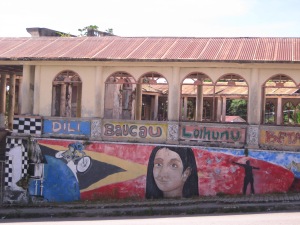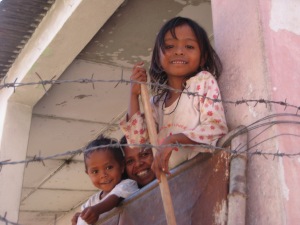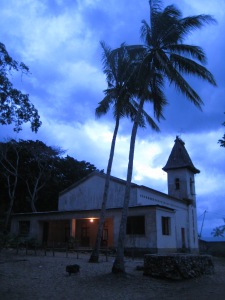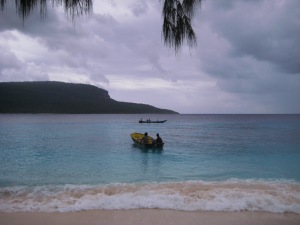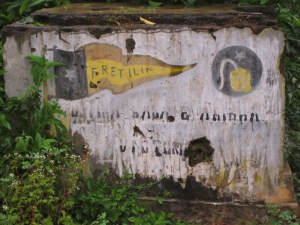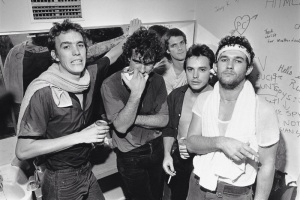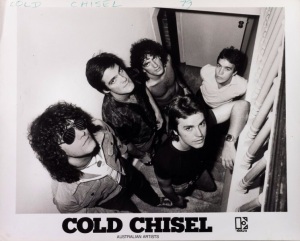I’ve hitch-hiked in China, been skydiving in New Zealand and eaten dog in Tonga, but it’s in Timor-Leste that I really decide to take my life in my hands.
We’re going to hire a car.
It seems like a fairly natural thing to do on a holiday, but the roads in Timor are notoriously bad, or nonexistent. Not surprisingly, decades of occupation and tragedy have done little for local infrastructure. The country has about thirty kilometres of good road to rub together. Even in Dili, the pot holes are craterous; some the size of a small car. The roads are so bad that although Baucau—the country’s second largest centre—is just over 120 kilometres away, it will take us five hours to drive there.
But we’ve heard of spectacular beaches and snorkelling to the east. I want to go there.
The microlets, or local buses, are lively but slowed by loads of rice, mattresses and chickens in hand fashioned cages, not to mention the passengers who hang out the door. I spy one heading out of the airport: “God Only Knows” is scrawled on the windscreen next to a lewd cartoon of a green woman in a bikini. All promises of an interesting journey, but no guarantees on the destination.
And for all my early bravado, I’m too scared to get on a motorbike.
So my friend Dimity and I get off the plane, and head straight to the country’s only hire car outlet. They know the roads are bad too and the chance of having an accident is high. No one will insure us, but it seems a deal can be cut to reduce your liability in the likely event that something goes wrong. We hand over a good portion of extra money and agree to go halves if we total the car.
They talk us into a three door Pajero. It has that new car smell, but the tyres look old. None of the other vehicles look more promising. Fingers crossed, we back out of the rental premises and drive onto one of Dili’s many one way streets, the wrong way.
After looping the back streets, we begin the climb up the mountain through folds of rainforest and road side stalls selling coconuts and bedraggled green vegetables.
Eventually, we start to hug the coastline. I’m bemused by pineapple shaped pandanus baskets on tables, one corner after another. We stop. A smiling mother and her four unsmiling children untie the pineapple package to reveal two kilos of sea salt. The road winds on, and the blue ocean to our left is almost blinding. Around one corner, we spy the husk of a troop carrier bearing the UN insignia, roof crushed and windows smashed. It’s only just hanging onto the cliff.
But our more immediate concern is whether we can avoid running over someone’s prized chook. With a radio of limited means, the soundtrack to our journey is the horn, beeping as we attempt to shepherd goats, pigs and chickens away from the wheels. I’ve been warned that road kill will require significant financial compensation, and can end in fists. I don’t have the will or vocabulary for a fight, so it’s slow and steady driving behind the wheel.
We arrive in Baucau, and the back tyre is looking precariously low. A few false starts lead us to a mechanic whose workshop is decorated with Xanana Gusmao stencils and portraits of Che Guevara. There’s a language barrier. I mime pumping up a tyre to the sudden crowd that has amassed around our vehicle. The Che fan club dissolve into giggles.
Eventually the tyre is pumped, and a container of fuel is strained through a cast off pair of shorts and funnelled into our tank. This is the petrol station, apparently.
The road trip continues. It’s as if we’ve passed through Pakistan and into Thailand as a stone littered steppe turns into green rice paddies with water buffaloes grazing. Ten kilometres on, windswept grey beaches remind me of picnics on Scottish beaches.
But it’s not a world tour; we’re still driving through Timor. Each village has its share of Fretilin flags and graffiti. “What do we wanna do for peace?” cries one school wall.
We decide to make for Tutuala and Jaco Island, renowned for pristine white beaches and the aquamarine waters that sell postcards. It’s Timor’s Far East, and the road progressively becomes more bumpy, and soon, indiscernible. We pass through crumbling ruins of old Timorese houses, raised on stilts, and decorated with swathes of shells and horse skulls. I buy some eggs and salad vegetables from a rare road stall. Forget about restaurants with byo alcohol; we’ll need to bring our own food.
As the light turns purple and the trees become more windswept, we pull up to Tutuala, and drive up a rubble strewn hill to the village’s only accommodation. It’s a pousada that remembers better times. A gang of children gather at our feet, and then turn fallen columns into slides. They frolic on the faded tables, under painted concrete umbrellas.
The caretaker arrives, and for five US dollars a night, this can be our home. It’s musty, and has the air of a forgotten Swiss ski lodge. There are old maps on the wall, and spider webs around the beds. No running water, just litre bottles which have been dutifully carried up by the caretaker for us to flush the toilet. Some of the windows are smashed; what role did this building play during Indonesian occupation? We beg some hot water, eat two minute noodles and watch the light fade over the cliffs.
The next day, after stiff Timorese coffee and bread rolls, it’s a treacherous 4WD crawl down to the beach. Two locals are quick to jump in our spare seats, and as we descend down a road which runs almost vertical, I understand why they didn’t want to walk. I’ve mentally emptied my bank account, certain the car is not for this world much longer, when we reach the beach, a fleet of outrigger canoes and a jumble of beach shacks.
For a small price, the fishermen persuade us that there are no crocodiles and drop us at Jaco Island, to rub noses with the angel fish and meditate amongst the coral. They land their canoe down the beach half an hour later, with a barracuda and Spanish mackerel tied to the helm. The fish will become our dinner. The fishermen disappear, and then rain clouds gather above. It’s the rumble of an unexpected dry season storm, and soon the ocean is fluorescent against the sky. Our fishermen soon appear in the distance, and ferry us back to land before the waves take over.
A few days later, when food supplies run only to bananas and rice, our car manages to cling to the scrabble of rocks on the track, back up to Tutuala. We stop once more in Baucau. There’s a swimming pool which is filled every three days with pure spring water from the mountain side, then drained again. It’s electric blue, and with cement banana lounges, it looks like a resort for the ancients. A get-away for Socrates, a few laps between classes and opining to the village square. I feel like I’m swimming in Evian.
We overnight at the Pousada Baucau, a bright pink guest house with the best round steak in town. I spend an hour on the porch with the hotel’s receptionist, a sparky woman named Gabriella. She trained to be a nun, but decided to leave the church. She doesn’t elaborate. Her parents were both Fretilin fighters, and sheltered in the mountains out of town. At night they would creep down to siphon water from buffalo drinking holes, filled with the blood of the disappeared, shot dead. Later, an expat friend tells me that our pink Pousada too was an interrogation and torture chamber during the occupation.
It’s a slow drive back to Dili, passing once more through Scotland, Thailand and Pakistan. The dusty capital—home to one million people, many more livestock and a giant statue of Jesus—is a welcome sight.
And unbelievably, the car is unscathed.
The country has much bigger problems than nervous tourists in hire cars, but it’s still with a sigh of relief that I hand over the keys and relinquish the little 4WD that could. We flag down a taxi driver with a cracked windscreen and just one broken door, and climb in.
I let him worry about the potholes and suicidal chickens. I watch the road, the occasional cluster of graves and the acres of frustrated graffiti splashed across Dili, as we drive to the airport.
